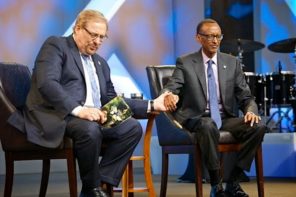In the face of reports that Ghana’s Western Region Minister recently called for the arrest of gays, a Ghanaian government source told RD today that the government was not “clamping down” on sexual minorities. The source, who did not want to be named since he was not speaking officially, said that Ghana is a law abiding country and that those on a crusade should take up the matter in the courts.
The issue appears to be a sensitive one for the government. The Ministry of Information and the Office of the President declined to speak to me and one staffer simply hung up when asked if the government supported recent calls to arrest gays. While President John Atta Mills has stated that he believes homosexuality is foreign to Ghanaian culture, his administration has refused comment on recent calls for government intervention.
Since late May, religious groups have been calling for government action against sexual minorities. On May 31, a media outlet reported that a non-governmental organization (NGO) had registered 8,000 gays, lesbians and bisexuals in the Western and Central regions of the country which, if accurate, would represent a significant increase over past estimates. Within days, religious groups united to call on the Ghanaian government for action against sexual minorities. Both Christian and Muslim coalitions have declared that they will not support a politician who favors relaxing the laws covering homosexuality.
Then, on July 20, Ghana’s Minister for the Western Region publicly questioned the existence of 8,000 sexual minorities but called for arrests if they are discovered. Minister Paul Evans Aidoo, told a Ghanaian radio interviewer that he believed the NGO had inflated the number “for its own selfish gains.” Unsure of the prevalence, Aidoo told Joy FM that there are landlords looking for gays among their tenants in order to report them to the police. If they are arrested, he said, then the courts can test the strength of the law. According to the Joy FM report, Aidoo hoped “to get rid of these people in the society.”
Some observers believe the number of sexual minorities may have been inflated in order to whip up opposition to homosexuality which could advance the standing of conservative politicians. Graham Knight, a British blogger living in Ghana, recently wrote that the claim of 8,000 sexual minorities has little support in fact. Knight concluded, in a blog post titled Did Ghana register 8000 homosexuals? The facts behind the hype that:
the real story is of a rather low-key workshop that has been sensationalized by the press, possibly with the collusion of a local doctor. The press reports are designed to create fear as are the unrepresentative group of Muslims claiming an imminent Sodom and Gomorrah for Africa.
While the accuracy of the original story is open to question, only a spark is needed to get a fire going—intentionally or not. And given the rhetoric in Ghana, it is difficult to avoid comparison to Uganda’s recent history in relation to sexual minorities. In March, 2009, three Americans spoke at a conference on homosexuality and used false and misleading information to inflame public sentiment against gays. Later that year, the Anti-Homosexuality Bill was tabled.
Although it did not get a vote in the recently expired Eighth Parliament, it will most likely be reintroduced soon in the new session. If passed, the law will make any homosexual intimacy punishable by life in prison, or death if the participants are HIV positive. In the months prior to the bill’s emergence, Muslim and Christian ministers called on the government to crack down on gays. Very similar rhetoric is now being heard in Ghana, with gays being accused of recruiting in schools and contributing to the rise in disease and moral decay.
If the media reports are an indication, Mr. Knight is correct that the Ghanaian public is growing fearful that gays will lead to catastrophe in that country. What is not clear is whether or not the Ghanaian government will follow Uganda and take steps to codify that fear into new or harsher laws.




